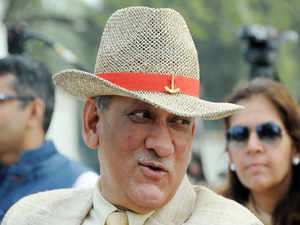
Gen Rawat is questioning privilege that is deemed as a given within the Army like he did through an order removing . soldiers posted as ‘sahayaks’ with retired officers.
General Bipin Rawat is an unusual Army chief. And not due to his different approach in Kashmir or the doggedness to face up to the Chinese in Dokalam, but largely because of the question he dares to pose to his own fraternity.
The office of the Army chief has always been seen as the representative embodiment of the ‘fauj’. He is what his Army is, reflecting both its glory and custom. Yes, he can be an agent of change, but usually in matters of strategy and expansion. Rarely, have you found someone who has questioned privilege, perks or benefits from a perceived sense of exalted status. This is a very sacred territory within the Army, one which is assumed as being undisputed within society. But Gen Rawat questions that. He is worried, a fact he disclosed to ET, that in reality civilian population may actually be getting “irritated” with secluded green zones of the Army. He wants cantonments to open their gates to civilians before they barge into it out of anger and frustrations. He doesn’t agree with the notion that a civilian cannot access the road to Delhi airport through the Delhi Cantt if there’s a traffic snarl, which is routine during rush hour, on NH-8.
Yes, he’s bound to get some of the military brass upset but it’s a question that cannot be wished away. Just like the ‘sahayak’ issue, which is a very emotive officer-soldier relationship but one that he feels requires relook especially if these soldiers end up spending their entire time outside combat formations because of these duties.
Now, these are deeply sensitive issues for an Army chief to raise with his own lot. But he has done so. This includes questioning military club culture, whether there should be elaborate partying in officer messes and the general conduct with civilian residents in cantonments.
In short, Gen Rawat is questioning privilege that is deemed as a given within the Army like he did through an order removing soldiers posted as ‘sahayaks’ with retired officers.
In a changing social dynamic, parity equations in offwork situations change both within the military hierarchy and outside. So, he wants to reconfigure civil-military harmony. The Army can’t be so segregated that it ends up inviting the ire of the civilian population, yet it must retain its core identity.
Which is why the questions that General Rawat asks of his Army will define his time in office. Many within the Army may agree or disagree, or even agree to disagree, with him but they surely can’t ignore his red flag or brush aside the questions.
